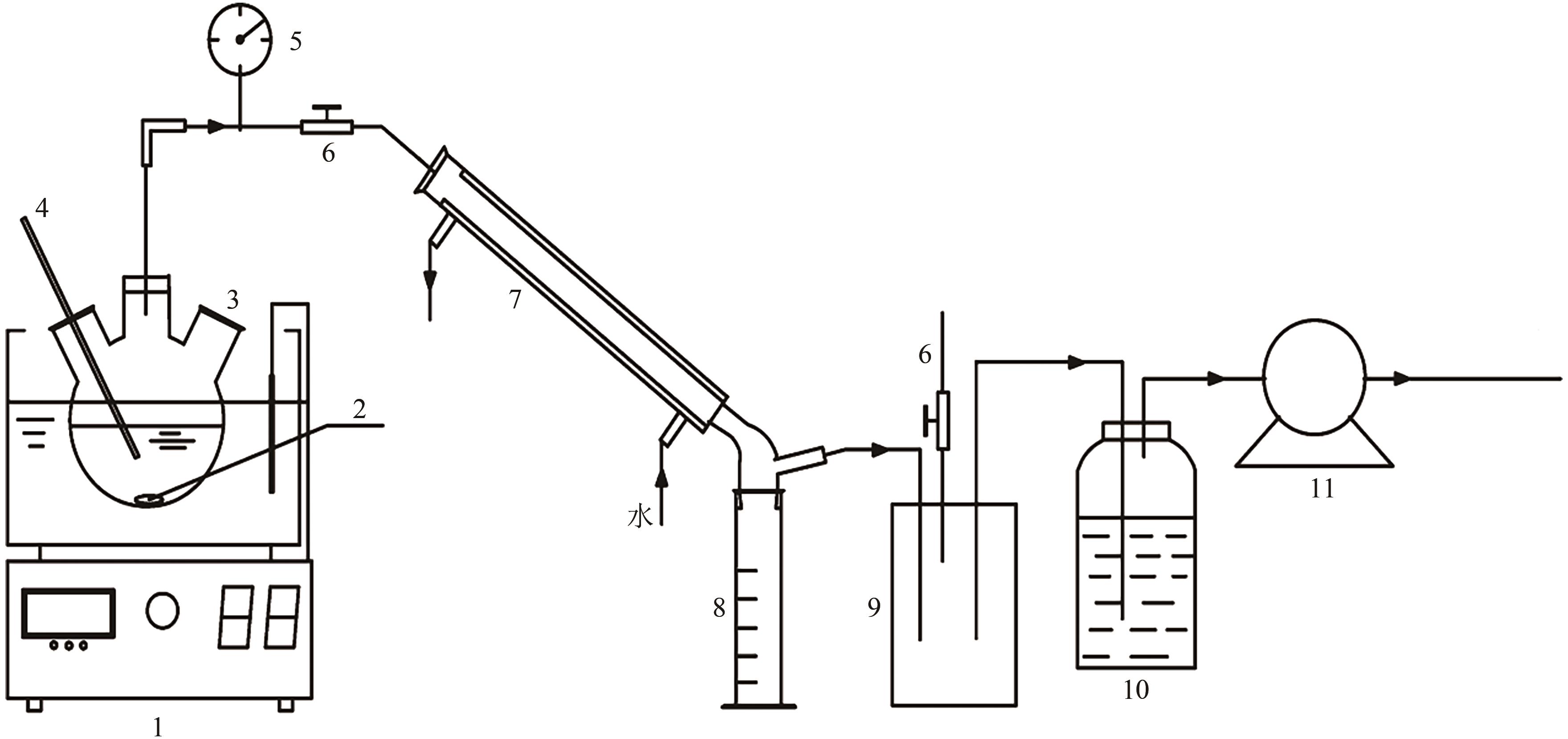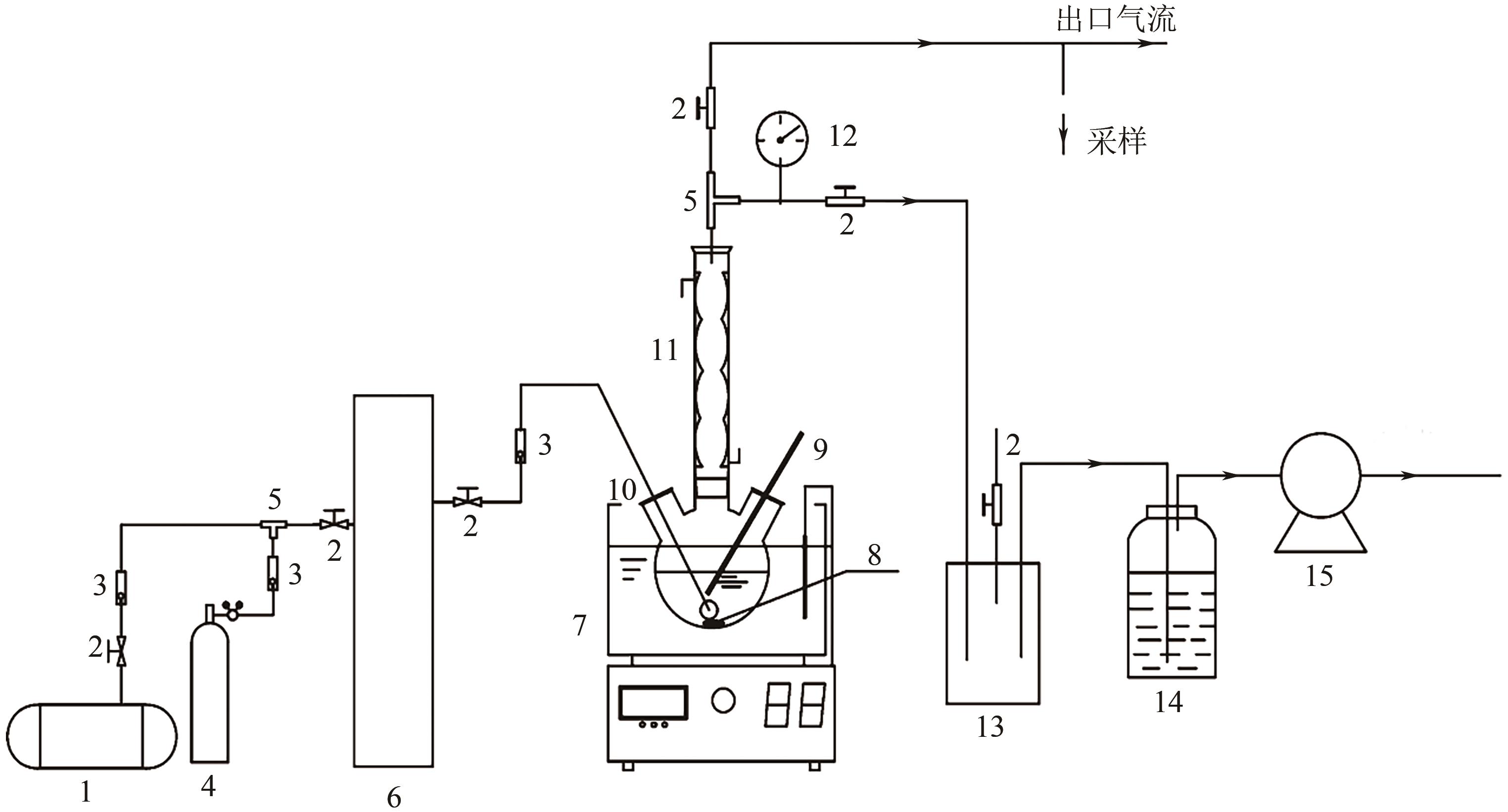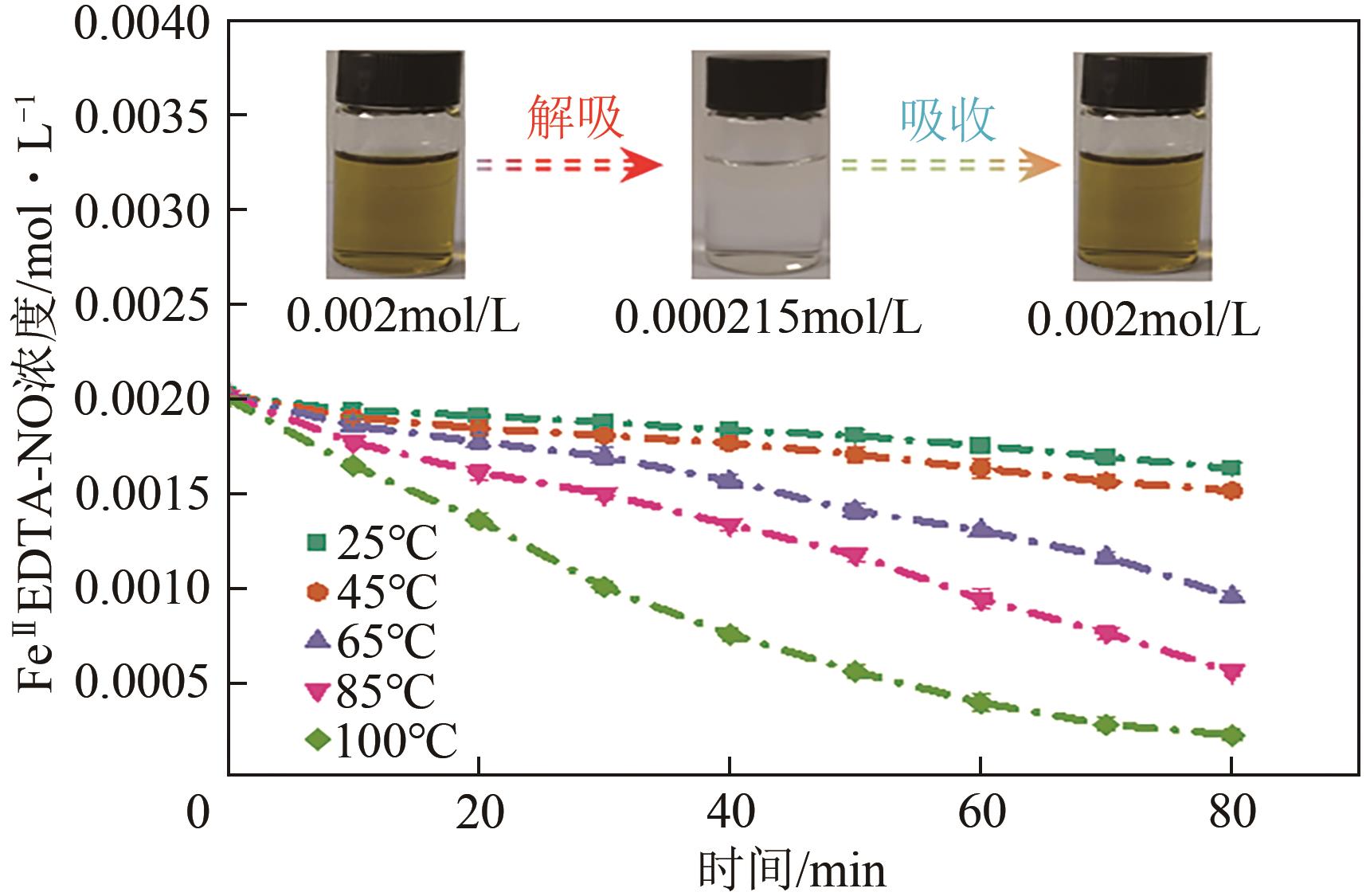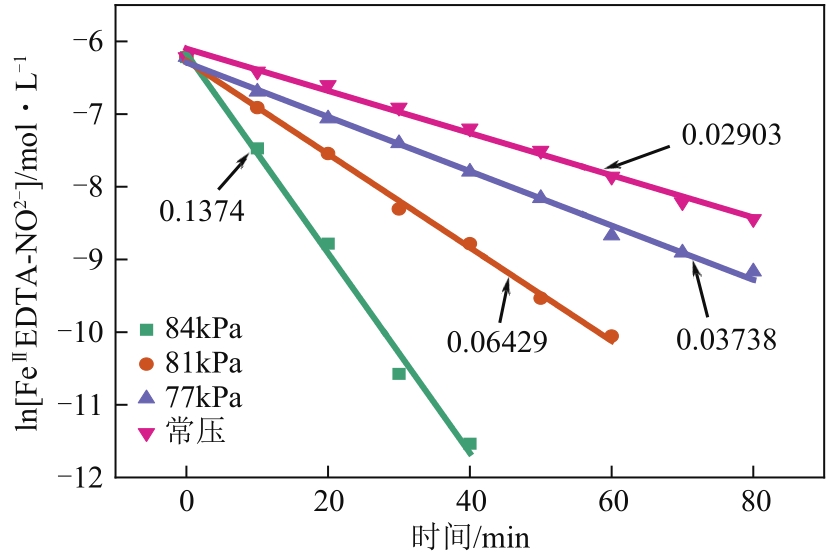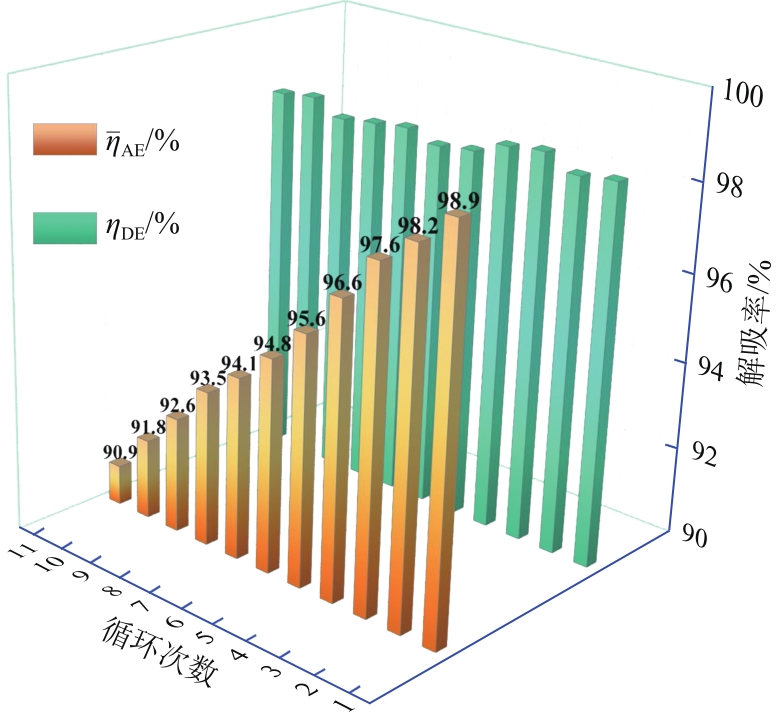Chemical Industry and Engineering Progress ›› 2022, Vol. 41 ›› Issue (11): 6176-6184.DOI: 10.16085/j.issn.1000-6613.2022-0076
• Resources and environmental engineering • Previous Articles Next Articles
Vacuum desorption of NO from Fe Ⅱ EDTA-NO solution generated in wet flue gas denitrification
ZHONG Lirong( ), HE Feiqiang(
), HE Feiqiang( ), DONG Beibei, LIU Ziwei, DING Jianhua
), DONG Beibei, LIU Ziwei, DING Jianhua
- School of Chemistry, Biology and Materials Science, East China University of Technology, Nanchang 310013, Jiangxi, China
-
Received:2022-01-11Revised:2022-05-11Online:2022-11-28Published:2022-11-25 -
Contact:HE Feiqiang
湿法烟气脱硝Fe Ⅱ EDTA-NO液的NO真空解吸
- 东华理工大学化学生物与材料科学学院,江西 南昌 310013
-
通讯作者:何飞强 -
作者简介:钟丽蓉(1999—),女,硕士研究生,研究方向为尾气处理。E-mail: 873918834@qq.com。 -
基金资助:江西省自然科学基金(20212BAB213004);国家自然科学基金(21808031)
CLC Number:
Cite this article
ZHONG Lirong, HE Feiqiang, DONG Beibei, LIU Ziwei, DING Jianhua. Vacuum desorption of NO from Fe Ⅱ EDTA-NO solution generated in wet flue gas denitrification[J]. Chemical Industry and Engineering Progress, 2022, 41(11): 6176-6184.
钟丽蓉, 何飞强, 董贝贝, 刘紫薇, 丁健桦. 湿法烟气脱硝Fe Ⅱ EDTA-NO液的NO真空解吸[J]. 化工进展, 2022, 41(11): 6176-6184.
share this article
Add to citation manager EndNote|Ris|BibTeX
URL: https://hgjz.cip.com.cn/EN/10.16085/j.issn.1000-6613.2022-0076
| 实验条件 | NO吸收 | NO解吸 |
|---|---|---|
| 吸收液体积/mL | 500 (0.01mol/L FeⅡEDTA+2% VC) | 500 |
| 温度/℃ | 25 | 70 |
| 真空度/kPa | 常压 | 79~81 |
| 气体流速/L·min-1 | 0.4 | |
| NO浓度/mL·m-3 | 500 | |
| 时间/min | 40 | 60 |
| 实验条件 | NO吸收 | NO解吸 |
|---|---|---|
| 吸收液体积/mL | 500 (0.01mol/L FeⅡEDTA+2% VC) | 500 |
| 温度/℃ | 25 | 70 |
| 真空度/kPa | 常压 | 79~81 |
| 气体流速/L·min-1 | 0.4 | |
| NO浓度/mL·m-3 | 500 | |
| 时间/min | 40 | 60 |
| 1 | LI Jue, WANG Li, HAN Chunqiu, et al. Industrial TiO2 based nacreous pigments as functional building materials: photocatalytic removal of NO[J]. Chinese Journal of Chemical Engineering, 2020, 28(10): 2587-2591. |
| 2 | HE Feiqiang, ZHU Xinyu, CHEN Xianchun, et al. Performance, optimization, and mechanism of nitric oxide removal by thiourea dioxide/FeⅡEDTA reaction systems[J]. Chinese Journal of Chemical Engineering, 2020, 28(11): 2918-2927. |
| 3 | 郝润龙, 钱真, 符乐, 等. 微波诱导催化脱硝研究进展[J]. 化工进展, 2021, 40(5): 2747-2752. |
| HAO Runlong, QIAN Zhen, FU Le, et al. Research progress of microwave-induced catalytic denitrification[J]. Chemical Industry and Engineering Progress, 2021, 40(5): 2747-2752. | |
| 4 | 陈赛, 贾明生, 郭明高, 等. SNCR脱硝技术在液态排渣煤粉工业锅炉中的应用[J]. 化工进展, 2020, 39(10): 4290-4296. |
| CHEN Sai, JIA Mingsheng, GUO Minggao, et al. Application of SNCR to reduction of NO x in an industrial scale slag-tap pulverized coal boiler[J]. Chemical Industry and Engineering Progress, 2020, 39(10): 4290-4296. | |
| 5 | 何飞强, 邓先和, 陈民. 乙二胺四乙酸铁络合物湿法络合脱硝液的再生研究进展[J]. 化工进展, 2018, 37(2): 737-743. |
| HE Feiqiang, DENG Xianhe, CHEN Min. Research progress on Fe(Ⅱ)EDTA regeneration accompanied wet denitrification[J]. Chemical Industry and Engineering Progress, 2018, 37(2): 737-743. | |
| 6 | SADA E, KUMAZAWA H, TAKADA Y. Chemical reactions accompanying absorption of nitric oxide into aqueous mixed solutions of iron(Ⅱ)-EDTA and sodium sulfite[J]. Industrial & Engineering Chemistry Fundamentals, 1984, 23(1): 60-64. |
| 7 | WANG Shijie, ZHANG Qi, ZHANG Gu, et al. Effects of sintering flue gas properties on simultaneous removal of SO2 and NO by ammonia-Fe(Ⅱ)EDTA absorption[J]. Journal of the Energy Institute, 2017, 90(4): 522-527. |
| 8 | ZHU Haisong, MAO Yanpeng, YANG Xiaojuan, et al. Simultaneous absorption of NO and SO2 into FeⅡ-EDTA solution coupled with the FeⅡ-EDTA regeneration catalyzed by activated carbon[J]. Separation and Purification Technology, 2010, 74(1): 1-6. |
| 9 | YAN Bei, YANG Jiehong, GUO Meng, et al. Study on NO enhanced absorption using FeⅡEDTA in (NH4)2SO3 solution[J]. Journal of Industrial and Engineering Chemistry, 2014, 20(4): 2528-2534. |
| 10 | ZHOU Zuoming, JING Guohua, ZHENG Xiangjiao. Reduction of Fe(Ⅲ)EDTA by Klebsiella sp. strain FD-3 in NO x scrubber solutions[J]. Bioresource Technology, 2013, 132: 210-216. |
| 11 | HE Feiqiang, DENG Xianhe, CHEN Min. Mechanism and kinetics of Fe(Ⅱ)EDTA-NO reduction by iron powder under anaerobic condition[J]. Fuel, 2016, 186: 605-612. |
| 12 | HE Feiqiang, DENG Xianhe, CHEN Min. Evaluation of Fe(Ⅱ)EDTA-NO reduction by zinc powder in wet flue gas denitrification technology with Fe(Ⅱ)EDTA[J]. Fuel, 2017, 199: 523-531. |
| 13 | HE Feiqiang, QIAN Yong, XU Jianping. Performance, mechanism, and kinetics of Fe(Ⅲ)EDTA reduction by thiourea dioxide[J]. Energy & Fuels, 2019, 33: 3331-3338. |
| 14 | HE Feiqiang, ZHU Xinyu, CHEN Xianchun, et al. Simultaneous removal of NO and SO2 from flue gas by FeⅡEDTA/sodium dithionite solutions[J]. Journal of Chemical Technology & Biotechnology, 2020, 95: 1392-1399. |
| 15 | HE Feiqiang, DENG Xianhe, CHEN Min. Nitric oxide removal by combined urea and FeⅡEDTA reaction systems[J]. Chemosphere, 2017, 168: 623-629. |
| 16 | HE Feiqiang, ZHU Xinyu, CHEN Xianchun, et al. Performance, mechanism, and kinetics of NO removal by combined ascorbic acid and FeⅡEDTA reaction systems[J]. Fuel, 2021, 284: 119070. |
| 17 | ZHU Xinyu, HE Feiqiang, XIA Meng, et al. Evaluation of Fe(Ⅲ)EDTA reduction with ascorbic acid in a wet denitrification system[J]. RSC Advances, 2019, 9(42): 24386-24393. |
| 18 | ZHANG Liqiang, JIANG Haitao, MA Chunyuan, et al. Microwave regeneration characteristics of activated carbon for flue gas desulfurization[J]. Journal of Fuel Chemistry and Technology, 2012, 40(11): 1366-1371. |
| 19 | CHEN Min, DENG Xianhe, HE Feiqiang. Study on the regeneration of basic aluminum sulfate SO2-rich solution by vacuum desorption[J]. Energy & Fuels, 2016, 30(10): 8469-8478. |
| 20 | XU H, ZHANG S T, LU X B, et al. Effect of ultrasound on SO2 desorption from sodium alkali desulphurization regeneration solution[J]. Chemical Engineering & Technology, 2010, 33(2): 231-236. |
| 21 | XUE Juanqin, LI Jingxian, LU Xi, et al. Absorption of sulfur dioxide using membrane and enhancement of desorption with ultrasound[J]. Transactions of Nonferrous Metals Society of China, 2010, 20(5): 930-934. |
| 22 | PI Xinxin, SUN Fei, GAO Jihui, et al. Microwave irradiation induced high-efficiency regeneration for desulfurized activated coke: a comparative study with conventional thermal regeneration[J]. Energy & Fuels, 2017, 31(9): 9693-9702. |
| 23 | VADILLO J M, HOSPITAL-BENITO D, MOYA C, et al. Modelling and simulation of hollow fiber membrane vacuum regeneration for CO2 desorption processes using ionic liquids[J]. Separation and Purification Technology, 2021, 277: 119465. |
| 24 | CHEN Guifang, SUN Xiaofei, FENG Yunqi, et al. Desorption of CO2, SO2, and NH3 in the vacuum evaporation of desulfurization wastewater[J]. Environmental Science and Pollution Research, 2021, 28(6): 6664-6674. |
| 25 | ZHANG Shihan, LI Wei, WU Chengzhi, et al. Reduction of Fe(Ⅱ)EDTA-NO by a newly isolated Pseudomonas sp. strain DN-2 in NO x scrubber solution[J]. Applied Microbiology and Biotechnology, 2007, 76(5): 1181-1187. |
| 26 | TERAMOTO M, KITADA S, OHNISHI N, et al. Separation and concentration of CO2 by capillary-type facilitated transport membrane module with permeation of carrier solution[J]. Journal of Membrane Science, 2004, 234(1/2): 83-94. |
| 27 | FAVRE E. Carbon dioxide recovery from post-combustion processes: can gas permeation membranes compete with absorption? [J]. Journal of Membrane Science, 2007, 294(1/2): 50-59. |
| 28 | YAN Shuiping, FANG Mengxiang, LUO Zhongyang, et al. Regeneration of CO2 from CO2-rich alkanolamines solution by using reduced thickness and vacuum technology: regeneration feasibility and characteristic of thin-layer solvent[J]. Chemical Engineering and Processing: Process Intensification, 2009, 48(1): 515-523. |
| 29 | WEXLER A. Vapor pressure formulation for water in range 0 to 100℃. A revision[J]. Journal of Research of the National Bureau of Standards Section A, Physics and Chemistry, 1976, 80A(5/6): 775-785. |
| 30 | LUTHER III G W, POPP J I. Kinetics of the abiotic reduction of polymeric manganese dioxide by nitrite: an anaerobic nitrification reaction[J]. Aquatic Geochemistry, 2002, 8: 15-36. |
| 31 | WANG Xiaojun, ZHANG Yu, DONG Xiyang, et al. Fe(Ⅱ)EDTA-NO reduction by sulfide in the anaerobic aqueous phase: stoichiometry and kinetics[J]. Energy & Fuels, 2013, 27(10): 6024-6030. |
| 32 | ZHONG Lirong, HE Feiqiang, LIU Ziwei, et al. Adsorption of uranium (Ⅵ) ions from aqueous solution by acrylic and diaminomaleonitrile modified cellulose[J]. Colloids and Surfaces A: Physicochemical and Engineering Aspects, 2022, 641: 128565. |
| [1] | WANG Shengyan, DENG Shuai, ZHAO Ruikai. Research progress on carbon dioxide capture technology based on electric swing adsorption [J]. Chemical Industry and Engineering Progress, 2023, 42(S1): 233-245. |
| [2] | SHI Keke, LIU Muzi, ZHAO Qiang, LI Jinping, LIU Guang. Properties and research progress of magnesium based hydrogen storage materials [J]. Chemical Industry and Engineering Progress, 2023, 42(9): 4731-4745. |
| [3] | SHAO Zhiguo, REN Wen, XU Shipei, NIE Fan, XU Yu, LIU Longjie, XIE Shuixiang, LI Xingchun, WANG Qingji, XIE Jiacai. Influence of final temperature on the distribution and characteristics of oil-based drilling cuttings pyrolysis products [J]. Chemical Industry and Engineering Progress, 2023, 42(9): 4929-4938. |
| [4] | WANG Yungang, JIAO Jian, DENG Shifeng, ZHAO Qinxin, SHAO Huaishuang. Experimental analysis of condensation heat transfer and synergistic desulfurization [J]. Chemical Industry and Engineering Progress, 2023, 42(8): 4230-4237. |
| [5] | LI Jiyan, JING Yanju, XING Guoyu, LIU Meichen, LONG Yong, ZHU Zhaoqi. Research progress and challenges of salt-resistant solar-driven interface photo-thermal materials and evaporator [J]. Chemical Industry and Engineering Progress, 2023, 42(7): 3611-3622. |
| [6] | YANG Jiatian, TANG Jinming, LIANG Zirong, LI Yinhong, HU Huayu, CHEN Yuan. Preparation and application of novel starch-based super absorbent polymer dust suppressant [J]. Chemical Industry and Engineering Progress, 2023, 42(6): 3187-3196. |
| [7] | WANG Baowen, LIU Tongqing, ZHANG Gang, LI Weiguang, LIN Deshun, WANG Mengjia, MA Jingjing. Reaction characteristics of CuFe2O4 modified desulfurization slag oxygen carrier with lignite [J]. Chemical Industry and Engineering Progress, 2023, 42(6): 2884-2894. |
| [8] | HE Chuan, WU Guoxun, LI Ang, ZHANG Fajie, BIAN Zijun, LU Chengzheng, WANG Lipeng, ZHAO Min. Characteristics of calcium and magnesium deactivation and regeneration of waste incineration SCR catalyst [J]. Chemical Industry and Engineering Progress, 2023, 42(5): 2413-2420. |
| [9] | SHANG Yu, XIAO Man, CUI Qiufang, TU Te, YAN Shuiping. Recovery characteristics of PVDF/BN-OH flat composite membrane for waste heat of hot stripped gas in CO2 capture process [J]. Chemical Industry and Engineering Progress, 2023, 42(3): 1618-1628. |
| [10] | XIE Yingchun, MA Hongting, XU Chang, MA Shuo, CHEN Mo, LIU Jun, SUN Guoqiang. Analysis of heat transfer characteristics in vertical tube of seepage falling film evaporative condenser [J]. Chemical Industry and Engineering Progress, 2023, 42(3): 1187-1194. |
| [11] | ZHOU Hao, ZHANG Heng, WEN Nini, WANG Xurui, XU Lu, LI Wei, SU Yaxin. Preparation and de-NO x performance of C3H6-SCR over Cu-SAPO-44 catalyst [J]. Chemical Industry and Engineering Progress, 2023, 42(3): 1373-1382. |
| [12] | ZHANG Qunli, HUANG Haotian, ZHANG Lin, ZHAO Wenqiang, ZHANG Qiuyue. Analysis of condensation waste heat recovery system of spray flue gas source heat pump [J]. Chemical Industry and Engineering Progress, 2023, 42(2): 650-657. |
| [13] | ZHANG He, LI Xiaoke, XIONG Ying, WEN Jin. Desalination and pollution treatment of fracturing flow-back fluid based on interfacial solar evaporation of hydrogel [J]. Chemical Industry and Engineering Progress, 2023, 42(2): 1073-1079. |
| [14] | WANG Shengnan, ZHENG Xu. Research on activated carbon fiber based composite adsorbents for atmospheric water harvesting [J]. Chemical Industry and Engineering Progress, 2023, 42(10): 5567-5573. |
| [15] | LIU Yulong, HU Nan, CHEN Xiangbiao, CHEN Sencai, ZENG Bingyong, DING Dexin. Circulating adsorption-desorption properties and kinetic analysis of uranium by strong basic anion resins [J]. Chemical Industry and Engineering Progress, 2023, 42(10): 5574-5583. |
| Viewed | ||||||
|
Full text |
|
|||||
|
Abstract |
|
|||||
